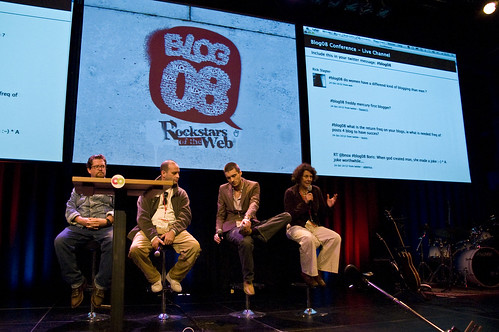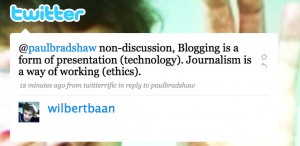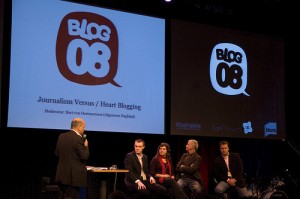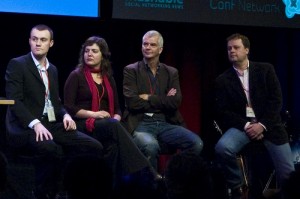Bloggers Hugh McLeod, Loren Feldman, Pete Cashmore and Elisabeth Winkler get up on stage to answer questions from the floor and the live backchannel at Twitter.

Rick Slagter asks the first question: ‘is blogging is the rescue of slow journalism?’
Loren Feldman is very explicit when comparing bloggers to journalists: “Bloggers aren’t journalists. You’re just a bunch of guys sitting in your livingroom, writing things.”
Pete Cashmore comes to the defence of bloggers and jokes that “sometimes we dress up and we wear pyjamas.” He describes the current media landscape as an eco-system where bloggers and journalists complement each other.
Winkler sees the overlap between journalism and blogging in the connections between opinion and fact. However, a fact needs a context because everyone has an agenda, and the major media aren’t very clear about their agenda. She sees blogging as a little more transparent.
Cashmore compares the discussion to the endless discussion that is still going on surrounding the term ‘web 2.0’. We spend a lot of time and posts on trying to define it, which leads to endless discussion, he says. The whole journalism versus bloggers debate depends on how you define journalism.
Paul Bradshaw from the Online Journalism Blog enters the debate with his opinion that ‘is blogging journalism?’ is an old question and that we need more challenging ones.
The best part of the discussion seems to be happening on Twitter, where Wilbert Baan (Interaction Designer of the Volkskrant newspaper website) replies to Paul Bradshaw’s statement with this insightful comment:

And me? I think the distinction between the medium and practice of blogging is an important one, especially in relation to journalism.
This post originally appeared on Anne Helmond’s blog.



